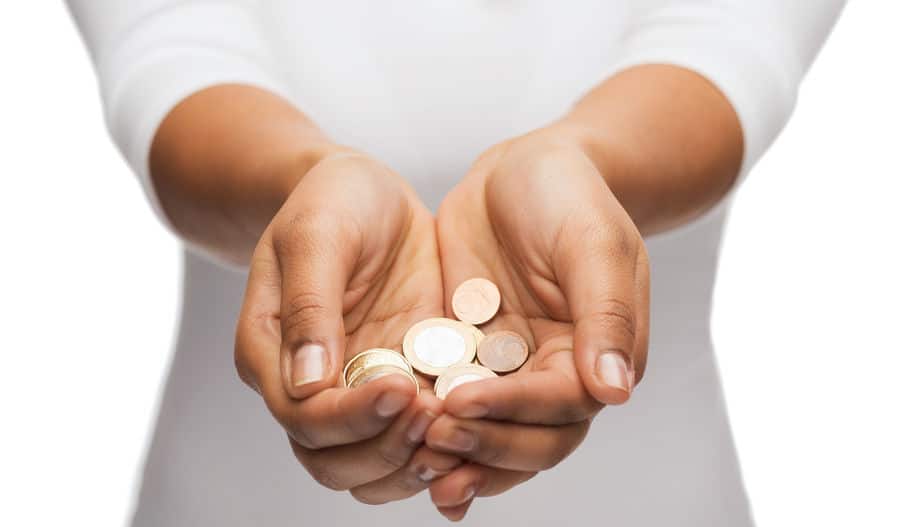I attend a lovely women’s development group with a beautiful ritual. At the end of each meeting, we take up a collection for “Kindness Cash.” A basket for donations is passed around the room, and a member volunteers to take the collection for that month. Their charge is to seek out a deserving person on whom to bestow a totally spontaneous act of kindness in the form of this cash gift. They then report back at the group’s next meeting. Recipients might include a harried mother having a bad day managing small children in the bank line, a person on the street recounting her daughter’s recent health struggles, or perhaps a teacher commenting on her lack of classroom school supplies. The surprised winner receives the cash on behalf of our group and is wished a happy day.
When it was my turn to take the Kindness Cash, I found the task—which admittedly caused great anxiety as the pressure built to find the perfect recipient—also had an unintended benefit. It turned my brain into a kindness-seeking machine. Each day, I was diligently searching for my potential lucky recipient, scanning faces and noticing situations unfold around me as I looked for ways to jump in and brighten someone’s day with my gift. During this month, I noticed my brain was responding to the challenge by actually making me more mindful and in the present. In addition, I found myself more willing to help family, friends, and strangers alike—to just generally extend more basic human kindness.
The concept of neuroplasticity tells us that the more we practice a task, the stronger the neural brain connections become as we learn and reinforce that certain behavior. Thus, focusing on negative events makes the brain notice and seek out more negative events, and practicing kind and positive behaviors begets more kind and positive behaviors. In this way, our thoughts and behaviors shape our brain’s actual structure.
It turns out that even small acts of kindness can do more to boost your happiness and health than any other behavior, according to Stephen Post, PhD, founder of the Center for Medical Humanities, Compassionate Care and Bioethics at Stony Brook University. “It’s good to be good and science says it’s so,” he says. “People who help others tend to be happier, healthier, and even live a bit longer. They are more resilient, form deeper friendships, and find more meaning and purpose in life as a direct consequence of helping others.”
Small acts of kindness are performed every day, and with all of the negative news surrounding us, they often go unnoticed. Parents make school lunches for their children and coach t-ball teams, strangers hold doors for each other, friends treat friends to coffee and a listening ear, community members make meals for their sick, and neighbors pull in each other’s trash cans.
Kindness is contagious: When we extend basic kindness to others, the recipient internalizes joy and appreciation and often passes these positive emotions and behaviors forward. We have witnessed this contagious effect many times in our women’s development group as the Kindness Cash recipients vow to seek out opportunities to help another.
So, are you wondering who was my own Kindness Cash lucky winner? On the very last day before our next meeting, I was in line at the local grocery store when an employee I had seen there for a long time answered my “How are you today?” with a recounting of her husband’s recent health issues and hospital stay. With sadness in my heart over her troubles, I silently bestowed the much-deserved gift on this lovely woman. Hugs were exchanged, and I am truly uncertain if my joy or hers was greater that afternoon!
The benefits of spreading kindness affect the giver just as much as the receiver, and the effects are long-lasting. Think of how much happier and healthier we all could be—what a different world we would live in—if we trained our brains to move away from the negative and toward connecting with each other by extending small kindnesses each and every day.
When I present workshops, I often reference the negativity bias, our brain’s hardwired ability to scan the environment for what could go wrong. Negative events attract so much attention; just turn on the morning news! The negativity bias sets us up for undue stress, anxiety, and depression as we search for the next problem on which to focus. But Kindness Cash helped me to do just the opposite—scan my environment to discover how I could helpcreate greater positivity.
Sandy Campbell, a 2018 CiWPP graduate, is a Health and Wellness Coach, and holds an MS in Counseling from Villanova University, a degree from the Institute of Integrative Nutrition, and a 200-hour yoga teacher training certification. After working for 10-plus years for a major pharmaceutical company, Sandy decided to step out of the corporate world and focus on improving her health, quality of life, and happiness. Her passion evolved into helping others meet their full potential through small but highly impactful dietary and lifestyle shifts. Focusing on nutrition, stress management, and positive psychology, Sandy works with clients in person and remotely; leads corporate wellness workshops for businesses and organizations, including the Federal Home Loan Bank of Pittsburgh, Mylan Pharmaceuticals, and the Community College of Allegheny County; and leads on-site and online programs, including her 11-Day Pure Energy Program, a clean eating boot camp. Learn more at sandycampbell.net or on Facebook at Sandy Campbell Wellness.


 Sandy Campbell, a 2018 CiWPP graduate, is a Health and Wellness Coach, and holds an MS in Counseling from Villanova University, a degree from the Institute of Integrative Nutrition, and a 200-hour yoga teacher training certification. After working for 10-plus years for a major pharmaceutical company, Sandy decided to step out of the corporate world and focus on improving her health, quality of life, and happiness. Her passion evolved into helping others meet their full potential through small but highly impactful dietary and lifestyle shifts. Focusing on nutrition, stress management, and positive psychology, Sandy works with clients in person and remotely; leads corporate wellness workshops for businesses and organizations, including the Federal Home Loan Bank of Pittsburgh, Mylan Pharmaceuticals, and the Community College of Allegheny County; and leads on-site and online programs, including her 11-Day Pure Energy Program, a clean eating boot camp. Learn more at
Sandy Campbell, a 2018 CiWPP graduate, is a Health and Wellness Coach, and holds an MS in Counseling from Villanova University, a degree from the Institute of Integrative Nutrition, and a 200-hour yoga teacher training certification. After working for 10-plus years for a major pharmaceutical company, Sandy decided to step out of the corporate world and focus on improving her health, quality of life, and happiness. Her passion evolved into helping others meet their full potential through small but highly impactful dietary and lifestyle shifts. Focusing on nutrition, stress management, and positive psychology, Sandy works with clients in person and remotely; leads corporate wellness workshops for businesses and organizations, including the Federal Home Loan Bank of Pittsburgh, Mylan Pharmaceuticals, and the Community College of Allegheny County; and leads on-site and online programs, including her 11-Day Pure Energy Program, a clean eating boot camp. Learn more at 